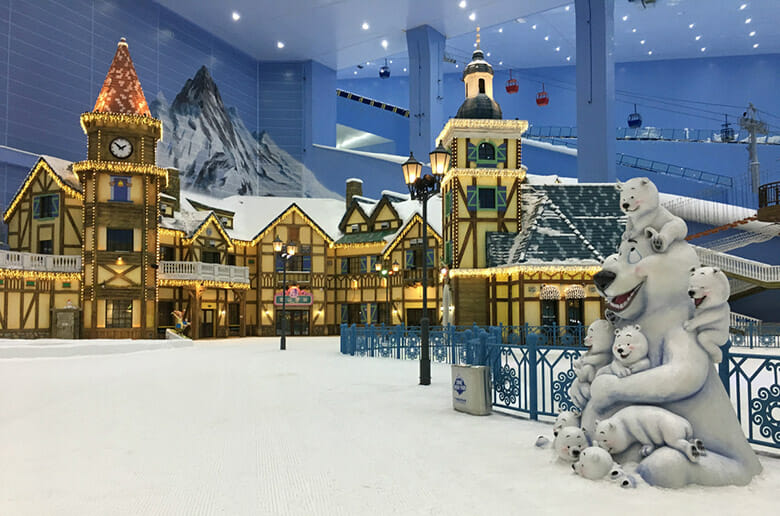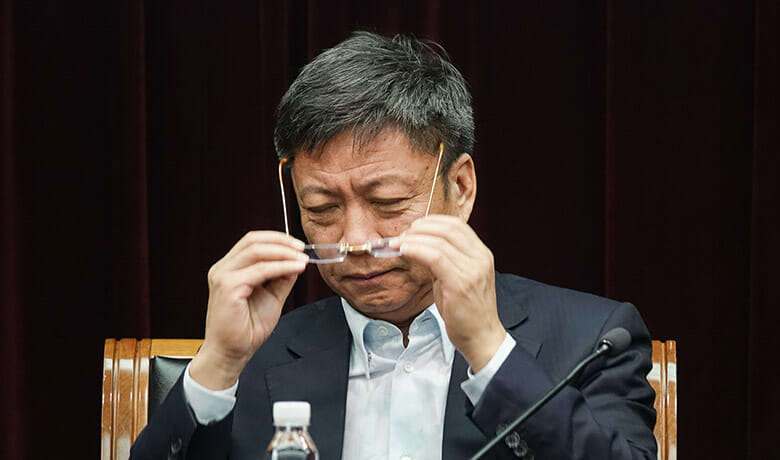
Sunac currently operates China’s largest indoor ski facility in Guangzhou
Struggling developer Sunac China Holdings has agreed to sell its majority stake in a sprawling indoor ski resort project in Shenzhen for RMB 3.6 billion ($509 million), two years after teaming up with a government-backed builder to purchase the site.
A unit of the Tianjin-based developer signed a deal to sell its 51 percent equity interest in the mixed-use project, which is designed to span a gross floor area of 1.31 million square metre (14.1 million square feet), to its joint venture partner Zhuhai Huafa Property Development, Sunac announced to the Hong Kong stock exchange on Tuesday.
Zhuhai Huafa owned the other 49 percent stake prior to the now-completed deal. Under the terms of the agreement, Sunac subsidiary Shenzhen Sunac Culture & Tourism has the option to repurchase its 51 percent stake in the project company and its associated debts before 23 November 2025.
Sunac, which released plans to restructure more than $9 billion in offshore debt last month, noted that the Shenzhen sale “[reduces] the overall debt size and debt pressure of the Group.” The transaction comes just a month after Sunac sold nearly 90 percent of its interest in a mixed commercial and residential project in Shanghai to a pair of state-owned investment firms for an estimated RMB 12 billion ($1.7 billion).
Investment Goes Downhill
Sunac’s latest sale involves a project in the Shenzhen World Exhibition & Convention Center, a massive complex backed by the municipal government in Bao’an district, about 8 kilometres (5 miles) from the southern Chinese city’s international airport.

Sunac China chairman Sun Hongbin sees an opportunity to repay debts (Getty Images)
Sunac partnered with Zhuhai Huafa to place the winning RMB 12.7 billion bid for the 436,809 square metre development site in November 2020, according to an account by S&P Global, citing the state-run China Internet Information Center.
The terms of the transaction required that the partners include 100,000 square metres of entertainment area on the mixed-use commercial and residential site, along with a 49,000 square metre hotel and a 742,500 square metre office building.
The residential portion of the site is earmarked for “talent housing,” a type of housing geared towards educated and skilled young residents, S&P Global reported. The dwellings are to be sold at 60 percent of the prices of private housing units in the area, with a cap of RMB 40,000 per square metre.
Slated to open in late 2026, the project is expected to contain the world’s largest indoor ski and snow resort, according to an account by Yicai Global. Sunac was reported to be in talks to sell its stake in the project as early as May 2022.
Putting aside the value of the repurchase option, Sunac expects to see a roughly RMB 510 million pre-tax loss from the newly announced sale of its stake. Proceeds from the sale will be used mainly to repay the loan Sunac obtained to purchase the project, which has an aggregate principal and interest of around RMB 2.1 billion.
Sunac noted in the filing that the project is at an early stage of development and will require a sizeable capital investment in the future. The sale at this point in time will “facilitate the resumption of normal development, construction and operation” of the project, Sunac added, and will reduce the company’s “current capital pressure.”
Sunac remains “optimistic” about the project and will continue to participate in its development, construction, sales and operation through a joint venture with Zhuhai Huafa, which released its own statement on the deal. Zhuhai Huafa is part of Huafa Group, a state-owned enterprise in the city of Zhuhai, Guangdong province.
Cash Crunch
In addition to ranking as China’s fifth largest developer by sales in 2021, Sunac holds the distinction of owning the world’s biggest indoor ski resorts, including the current world champion, the 80,000 square metre Harbin Wanda Indoor Ski and Winter Sports Resort.
That facility is one of 13 cultural tourism projects that Sunac purchased from embattled commercial developer Wanda Group, along with 76 hotels, for RMB 63.18 billion in China’s largest-ever real estate deal in July 2017. Sunac also bought Wanda’s tourism management business for RMB 6.28 billion the following year.
Aside from the Harbin project, the real estate giant chaired by Sun Hongbin owns five other ski resorts in Chengdu, Chongqing, Guangzhou, Kunming and Wuxi. Sunac’s winter-themed projects are largely responsible for growth in the company’s culture and tourism business, which also encompasses malls, high-end hotels, and water sports properties, according to a 2021 Bloomberg report.
Despite what Sunac described as the “rapid development” of its snow-related business in 2021, however, the company is among a large number of debt-strapped Chinese developers that have descended into crisis following the government’s crackdown on excessive leverage in the real estate sector.
The company defaulted on a dollar bond in May of last year, and in December, Sunac unveiled a plan to restructure its $9.1 billion of offshore debt by converting up to $4 billion into shares or equity-linked instruments while exchanging the rest into new dollar bonds.
The troubled developer has ramped up asset sales to help meet its financial obligations, including selling its stake in the Shanghai Bund One Sino Park last month, and offloading 45.5 million shares in mainland property brokerage Beike to raise $1.08 billion in 2201.
Leave a Reply